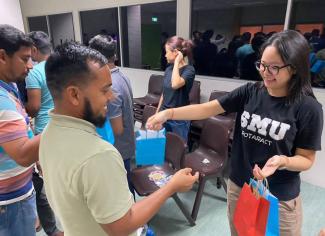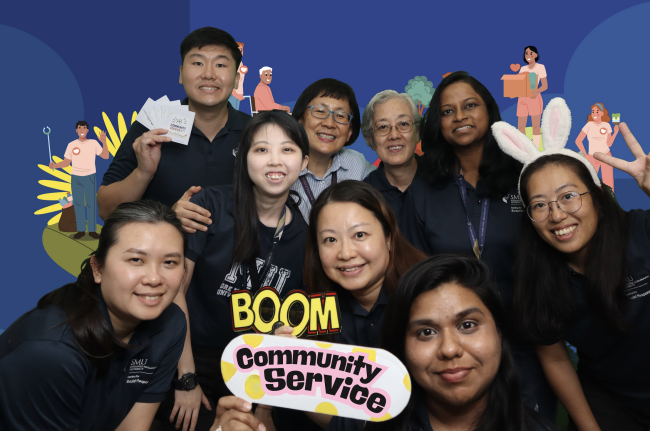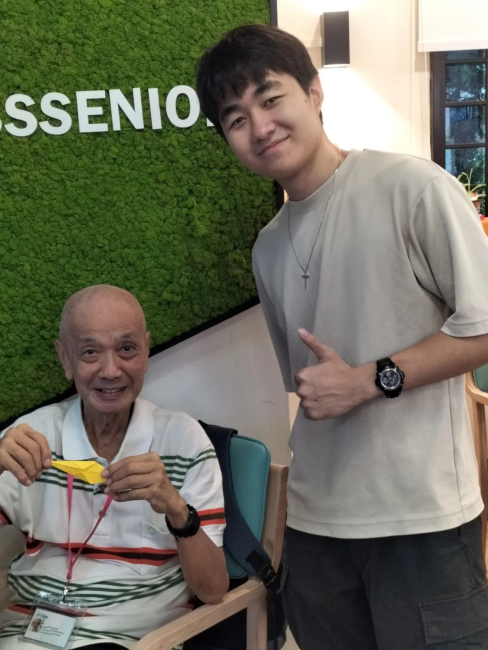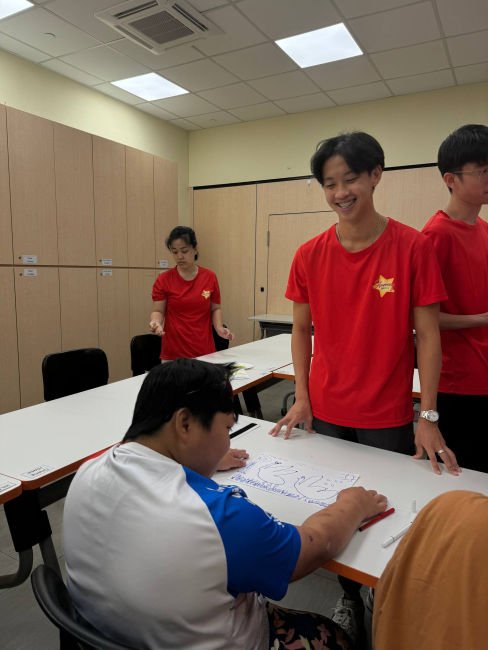
When Singapore Management University (SMU) was founded in 2000, it broke new ground by making community service a graduation requirement – the first university in Singapore to do so. At the time, the idea was ambitious: that students could learn as much outside the classroom as they did within, and that empathy, responsibility, and civic engagement should be woven into the very DNA of a university education.
Twenty-five years on, the results speak for themselves. SMU students have contributed more than 4.2 million hours of service across 14,500 projects, addressing issues from eldercare and disability inclusion to migrant welfare and climate change.
What began as a pioneering commitment to civic learning has grown into a powerful tradition of service, one that continues to define SMU’s silver jubilee celebrations with renewed purpose.
This year’s incoming freshmen lived out that legacy during orientation in the largest community service initiative in SMU’s history. Over 1,600 students volunteered from day one, stepping into the community even before setting foot in a lecture hall. Their energy reflects not just enthusiasm but a shared belief that service is not a side activity to university life, but its beating heart.
That same spirit of service was highlighted on CNA938’s Doing Good, Feeling Good segment, where six SMU voices – staff, students, and alumni – reflected on how community service has shaped lives over 25 years, from its beginnings to its impact today and beyond graduation.
At the centre of this movement is Devi Mani, Head of the Centre for Social Responsibility (C4SR), who continues to steer SMU’s service journey. She explains that community service has always been integral to holistic education at SMU.

“We didn’t want to just prepare our students academically. Community service gives them empathy, civic-mindedness and a sense of purpose — qualities that are critical when they go into the working world. It exposes them to real challenges and helps them see the role they can play in society,” said Devi.
Her clarity of purpose captured why more than 80 per cent of SMU students go beyond the required 80 hours of service. For many, those hours mark the beginning of a lifelong commitment to making a difference.
Listen to Devi’s interview here.
Community service at SMU often begins as a step into the unknown, but for many students, it quickly becomes a source of discovery and growth. Two undergraduates – Siti Noormasliana Bte Noorazman (Mas) and Estrella Kwok – show how volunteering can shape not only the communities they serve, but also the way they see the world.
For Mas, a final-year student at SMU School of Social Sciences, Project Candela became a platform to bridge gaps between Singaporeans and migrant workers. “My passion lies in diversity, equity and inclusion… It’s about creating a feeling that one truly belongs,” she explained. The work challenged assumptions: “We thought language would be a barrier, but humour, gestures and even Singlish created an easy shared understanding.” Through these encounters, she found perspective, purpose, and a commitment to closing social divides.
Estrella, a third-year Computing and Information Systems student, has taken Project Candela into its fourth edition while also leading the third iteration of Project Rhize, which engages professionals on biodiversity and climate issues. “I’d never worked with migrant workers or on biodiversity before SMU, but these projects showed me how change can begin in our own spaces,” she said. Bringing sustainability efforts onto campus made them tangible: “When people see biodiversity where they study every day, it becomes personal and relevant.”
Together, Mas and Estrella remind us that giving back is not one-way. It is also about gaining new perspectives, deeper empathy, and the confidence to act with compassion.
Listen to Mas and Estrella’s interview here.
If Project Candela and Project Rhize show how students innovate, others reveal the power of tradition.
Project Inspirar, launched in 2008, continues to serve Singapore’s seniors, many of whom face challenges in a rapidly digitalising society. Under the leadership of Joshua Cher, a Year 2, Computing and Information Systems student and also President of Project Inspirar 2025, the project helps older adults stay connected, safe, and confident in navigating technology. “It really starts from small things – listening, answering questions. Those small acts often bring out the most real change in seniors’ lives,” Joshua reflected.

Meanwhile, starringSMU, the university’s longest-running student-led service project since 2007, has been empowering persons with disabilities through skill-building and inclusion. Glenn Yeo, a Year 2 Business student and President of starringSMU 2025, sees his role as part of a legacy that stretches across student generations. “It’s not just big actions. Small, consistent gestures – a kind word, a helping hand – can change assumptions,” he said.

These flagship projects stand as reminders that SMU’s service culture is not a passing trend but a living tradition renewed each year by new cohorts of students.
Listen to Joshua and Glenn’s interview here.
For some, the service journey does not end at graduation, and stretches across borders.
Gabriel Tan, BBM (2019) founded Bamboo Builders in 2017 while still an undergraduate.
What began as a student initiative has grown into a regional social leadership incubator that equips young people to design and lead their own impact projects. Today, it has engaged more than 25,000 youths across ASEAN on issues from digital literacy to sustainability.
Reflecting on the role of mentorship, Gabriel shared: “When I first started out, I felt really alone — especially because, as a young person, you want to create change, you have a lot of passion for it. But the reality is that not everyone around your age in Singapore probably feels the same way. So you feel very alone… That’s why peer mentorship is so important. I found a group of friends who came together, and we supported each other through our challenges. You realise you’re not alone. And that’s why we also want to create a community at Bamboo Builders – to mentor and energise like-minded changemakers, not just in Singapore, but beyond as well.”
His journey shows how the seeds of service planted at SMU can grow into lifelong commitments, evolving beyond volunteering into mentoring, equipping, and inspiring the next generation of changemakers.
Listen to Gabriel’s interview here.
A Legacy of Community Service that Lives On
As SMU looks ahead, these stories suggest a future where service remains central to the student experience – not as a requirement to be fulfilled, but as an opportunity to grow and give back. From freshmen volunteers to alumni changemakers, the common thread is clear: service transforms both givers and receivers.
Whether it is Devi and her C4SR team shaping the culture, Mas and Estrella advancing inclusion and sustainability, Joshua and Glenn sustaining flagship initiatives, or Gabriel scaling impact across the region, each embodies a facet of SMU’s legacy.
Together, they affirm a simple yet powerful belief: at SMU, service is part of who we are.
Catch the full interviews on CNA938 to hear how these students are making a real difference — and what drives them to serve.